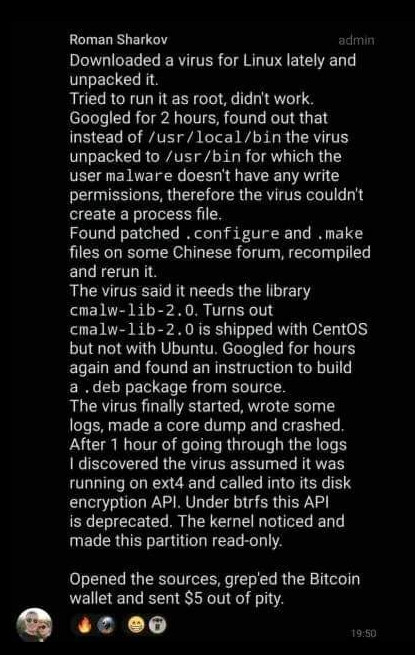Technically they still are, but since you don’t have a hand on the seed, practically they are not.
- 0 Posts
- 8 Comments
What happened to my computers being reliable, predictable, idempotent ? :'(
On a side note, it’s systemd, no damn uppercase D at the end.
Usually Linux has at least comparable framerates to Windows, if not faster.
CS2 beg to differ.
Holly shit, after looking things up it’s even worse than I thought…
Playing Valorant will need to enable TPM 2.0 and secure boot under windows 11 OS, you have to check that your motherboard is support TPM 2.0 system. (NOTE: If your system unable to support TPM2. 0, the only way that you can play Valorant is change your windows to older version as windows 10.)
Damn, Riot effectively turning PC into console…

 13·9 months ago
13·9 months agoHere is why :)


 7·9 months ago
7·9 months agoExcept that games are broken at release and need day1 patch in order to work. Although you will ship BD, the day update servers are taken down, your physical copy won’t allow you to play the game either.
The only question I have is : Is torrenting game patchs / updates concidered piracy as well ? If it is, we are definitely doomed.

You are taking all my words way too strictly as to what I intended :)
It was more along the line : Me, a computer user, up until now, I could (more or less) expect the tool (software/website) I use in a relative consistant maner (be it reproducing a crash following some actions). Doing the same thing twice would (mostly) get me the same result/behaviour. For instance, an Excel feature applied on a given data should behave the same next time I show it to a friend. Or I found a result on Google by typing a given query, I hopefully will find that website again easily enough with that same query (even though it might have ranked up or down a little).
It’s not strictly “reliable, predictable, idempotent”, but consistent enough that people (users) will say it is.
But with those tools (ie: chatGPT), you get an answer, but are unable to get back that initial answer with the same initial query, and it basically makes it impossible to get that same* output because you have no hand on the seed.
The random generator is a bit streached, you expect it to be different, it’s by design. As a user, you expect the LLM to give you the correct answer, but it’s actually never the same* answer.
*and here I mean same as “it might be worded differently, but the meaning is close to similar as previous answer”. Just like if you ask a question twice to someone, he won’t use the exact same wording, but will essentially says the same thing. Which is something those tools (or rather “end users services”) do not give me. Which is what I wanted to point out in much fewer words :)